Judge Rakoff is Rattling Wall Street Cages Again

After covering Wall Street, the financial markets and economic policy for much of the past two decades I can count on one hand the number of people I’ve written about whom I’ve come to admire as figures truly looking out for the greater public good.
Wall Street is, after all, Wall Street.
There’s John Bogle, the legendary founder of The Vanguard Group who in 1975 introduced index funds to a mass market of Mom and Pop investors. Index funds such as the Vanguard 500, which track the value of a large group of stocks, have allowed Main Street to tap into Wall Street’s vast profits while greatly reducing the risk inherent to betting on the stock market.
Vanguard and index funds made Bogle a wealthy man, but he’s never stopped preaching the value of steady, long-term investing for the average investor. His philosophy may not make you rich, but you won’t lose everything on some hyped-up Internet IPO either.
Arthur Leavitt, who led the Securities and Exchange Commission during the 1990s technology bubble, also struck me as someone in the world of high finance who was looking out for the rest of us.
Amid the frenzy of Internet IPOs in the late 1990s, when seemingly everyone -- analysts, fund managers, the media -- was cheering on a bevy of wild new dotcom stocks each week, Leavitt publicly rained on the parade. In a purposely high-profile speech at the height of the craze, he referred to the new issues market as the “IPO game,” and warned retailer investors away from the risky deals.
But Leavitt’s SEC missed Madoff, and that was egregious.
A Free Thinker and Iconoclast
Now comes U.S. District Judge Jed S. Rakoff, seated in the southern district of New York, which is to say the heart of the financial world. As a federal judge in Manhattan, Rakoff has literally had a front row seat as all manner of alleged financial malfeasance has spilled out in various court cases brought by regulators against some of Wall Street’s biggest players.
Rakoff already had a reputation as a free-thinker on the bench and a bit of an iconoclast long before cases related to the financial crisis began to show up on his docket. Once they did the cases seemed to add fuel to some inner fire burning within the judge. Two cases in particular prompted Rakoff to turn the often-cozy relationship between Wall Street and securities regulators on its ear.
In the first, Rakoff refused to approve a $33 million settlement reached in 2009 between Bank of America (NYSE:BAC) and the SEC tied to charges the bank lied to shareholders about billions of dollars in bonuses promised to executives ahead of the bank’s takeover of Merrill Lynch.
Rakoff, in a biting but elegant ruling that quoted Oscar Wilde, said the only people punished under the settlement were Bank of America shareholders.
Two years later, in an equally provocative ruling, Rakoff refused to sign off on a $285 million settlement between Citigroup (NYSE:C) and the SEC from a case in which the bank was charged with defrauding investors.
In addition to calling the penalty portion of the settlement “pocket change,” Rakoff took particular exception to the time-honored tradition that allowed Citigroup to “neither admit nor deny” the allegations under the terms of the deal.
There can be no benefit to the public, the judge said, if serious financial transgressions are swept under the rug via cash settlements and legal jargon that allow charges to disappear as if they never happened.
The SEC and other financial regulators have since hardened their position on allowing firms to settle without admitting or denying guilt.
Fraud at Center of Financial Crisis
In his latest unexpected broadside at Wall Street and the regulators charged with keeping it clean, Rakoff has penned a long essay for the venerable New York Review of Books entitled “The Financial Crisis: Why Have No High-Level Executives Been Prosecuted?”
The judge takes pains to inform his readers that he has no specific knowledge of any Wall Street executive who committed a criminal act in the run-up to the financial crisis. Yet he makes a strong case that criminal prosecutions could have -- and perhaps should have -- occurred.
Possibly so that the essay wouldn’t be viewed solely as a screed against archetypal Wall Street villains and incompetent -- or worse, corrupt -- regulators, Rakoff suggests that there’s plenty of blame to go around for the daisy chain of fraud that nearly toppled the global economy five years ago.
Using the blunt, common-sense approach that infuses many of his rulings, Rakoff points out that virtually every top regulator, prosecutor and investigator who has looked into the crisis has acknowledged the systemic fraud at its center.
But fraud is not some esoteric concept that originates organically and then flows about on its own energy. Hardly. Criminal fraud, the kind that can be prosecuted, is knowingly committed by managers and executives – real people -- who consciously make a decision to lie and mislead, unusually in pursuit of profit.
Rakoff says that kind of fraud was clearly pervasive ahead of the crisis and wonders aloud why real people -- the decision makers who called the shots -- haven’t been held accountable.
It’s a great question and kudos to Rakoff for asking it so eloquently.



















